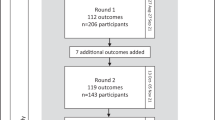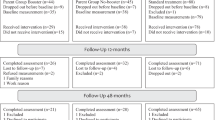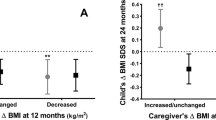Abstract
Background
Obesity in Childhood is a significant public health issue, which requires both a preventative and treatment approach. International guidelines continue to recommend family-focused, multicomponent, childhood weight management programmes and many studies have investigated their effectiveness, however, findings have been mixed and primarily based on weight. Thus, the aim of this review was to assess the effectiveness of group-based parent-only interventions on a broad range of child health-related outcomes and to investigate the factors associated with intervention outcomes.
Methods
An electronic database search was conducted using CINAHL, Medline, PsychINFO, Embase and the Cochrane Database of Systematic Reviews: 522 articles were identified for full text review and 15 studies were selected. The quality of studies were appraised and data were synthesised according to the review aims.
Results
Parent-only group interventions are effective in changing children’s weight status, as well as other outcomes such as health behaviours and self-esteem, although these were reported inconsistently. Parent-only interventions were generally found to be similar to parent-child interventions, and minimal contact interventions but better than a waiting list control. Factors found to be associated with treatment outcomes, included session attendance, the child’s age and weight at baseline, socioeconomic status of families and modification to the home food environment. The methodological quality of the studies included in the review was low, with only six studies rated to be methodologically adequate.
Conclusions
Parent-only interventions may be an effective treatment for improving the health status of children and their families, particularly when compared with waitlist controls. However, results need to be interpreted with caution due to the low quality of the studies and the high rates of non-completion.
This is a preview of subscription content, access via your institution
Access options
Subscribe to this journal
Receive 12 print issues and online access
$259.00 per year
only $21.58 per issue
Buy this article
- Purchase on Springer Link
- Instant access to full article PDF
Prices may be subject to local taxes which are calculated during checkout

Similar content being viewed by others
Data availability
Given that this was a systematic review, there is no raw data associated with this study. However, the search string used is outlined in the methods section of the study.
References
Eckersley RM. Losing the battle of the bulge: causes and consequences of increasing obesity. Med J Aust. 2001;174:590–2. https://doi.org/10.5694/j.1326-5377.2001.tb143446.x.
Mokdad A, Ford E, Bowman B, Dietz W, Vinicor F, Bales V, et al. Prevalence of obesity, diabetes, and obesity-related health risk factors, 2001. JAMA. 2003;289:76.
Parsons TJ, Power C, Logan S, Summerbell CD. Childhood predictors of adult obesity: a systematic review. Int J Obes Relat Metab Disord. 1999;23:S1–107. PMID: 10641588.
Singh AS, Mulder C, Twisk JW, van Mechelen W, Chinapaw MJ. Tracking of childhood overweight into adulthood: a systematic review of the literature. Obes Rev. 2008;9:474–88. https://doi.org/10.1111/j.1467-789X.2008.00475.x.
Whitaker RC, Wright JA, Pepe MS, Seidel KD, Dietz WH. Predicting obesity in young adulthood from childhood and parental obesity. N Engl J Med. 1997;337:869–73. https://doi.org/10.1056/NEJM199709253371301.
Al-Khudairy L, Loveman E, Colquitt JL, Mead E, Johnson RE, Fraser H, et al. Diet, physical activity and behavioural interventions for the treatment of overweight or obese adolescents aged 12 to 17 years. Cochrane Database Syst Rev. 2017;6:CD012691 https://doi.org/10.1002/14651858.CD012691.
Mead E, Brown T, Rees K, Azevedo LB, Whittaker V, Jones D, et al. Diet, physical activity and behavioural interventions for the treatment of overweight or obese children from the age of 6 to 11 years. Cochrane Database Syst Rev. 2017;6:CD012651 https://doi.org/10.1002/14651858.CD012651.
Summerbell CD, Moore HJ, Vögele C, Kreichauf S, Wildgruber A, Manios Y, et al. Evidence-based recommendations for the development of obesity prevention programs targeted at preschool children. Obes Rev. 2012;13:129–32. https://doi.org/10.1111/j.1467-789X.2011.00940.x.
National Institute for Health and Care Excellence. Obesity in children and young people: prevention and lifestyle weight management programmes. NICE Guidelines. 2015 QS94. https://www.nice.org.uk/guidance/qs94 (accessed 17 March 2021).
Oude Luttikhuis H, Baur L, Jansen H, Shrewsbury VA, O’Malley C, Stolk RP, et al. Interventions for treating obesity in children. Cochrane Database Syst Rev. 2009 Jan;CD001872. https://doi.org/10.1002/14651858.CD001872.pub2. Update in: Cochrane Database Syst Rev. 2019 Mar 07;3:CD001872. PMID: 19160202.
Upton D, Upton P, Bold J, Peters DM Regional evaluation of weight management programmes for children and families. 2012. http://www.obesitywm.org.uk/resources/Worcester_Report_Fina.pdf (accessed 02 March 2021).
Jull A, Chen R. Parent-only vs. parent-child (family-focused) approaches for weight loss in obese and overweight children: a systematic review and meta-analysis. Obes Rev. 2013;14:761–8. https://doi.org/10.1111/obr.12042.
Ewald H, Kirby J, Rees K, Robertson W. Parent-only interventions in the treatment of childhood obesity: a systematic review of randomized controlled trials. J Public Health (Oxf). 2014;36:476–89. https://doi.org/10.1093/pubmed/fdt108.
Loveman E, Al-Khudairy L, Johnson RE, Robertson W, Colquitt JL, Mead EL, et al. Parent-only interventions for childhood overweight or obesity in children aged 5 to 11 years. Cochrane Database Syst Rev. 2015;2015:CD012008 https://doi.org/10.1002/14651858.CD012008.
Brown T, Moore TH, Hooper L, Gao Y, Zayegh A, Ijaz S, et al. Interventions for preventing obesity in children. Cochrane Database Syst Rev. 2019;7:CD001871 https://doi.org/10.1002/14651858.CD001871.pub4.
Morgan F, Weightman A, Whitehead S, Brophy S, Morgan H, Turley R, et al. Effectiveness and cost effectiveness of lifestyle weight management services for children and young people, 2013 https://www.nice.org.uk/guidance/ph47/evidence/review-of-effectiveness-and-cost-effectiveness-pdf-430360093. Accessed 02 March 2021.
Griffiths LJ, Parsons TJ, Hill AJ. Self-esteem and quality of life in obese children and adolescents: a systematic review. Int J Pediatr Obes. 2010;5:282–304. https://doi.org/10.3109/17477160903473697.
Hayes JF, Altman M, Coppock JH, Wilfley DE, Goldschmidt AB. Recent updates on the efficacy of group based treatments for pediatric obesity. Curr Cardiovasc Risk Rep. 2015;9:16 https://doi.org/10.1007/s12170-015-0443-8.
Moher D, Liberati A, Tetzlaff J, Altman DG, PRISMA Group. Preferred reporting items for systematic reviews and meta-analyses: the PRISMA statement. Ann Intern Med. 2009;151:264–9, W64. https://doi.org/10.7326/0003-4819-151-4-200908180-00135.
Moher D, Shamseer L, Clarke M, Ghersi D, Liberati A, Petticrew M, et al. Preferred reporting items for systematic review and meta-analysis protocols (PRISMA-P) 2015 statement. Syst Rev. 2015;4:1.
Prictor M, Hill S. Cochrane consumers and communication review group: leading the field on health communication evidence. J Evid Based Med. 2013;6:216–20. https://doi.org/10.1111/jebm.12066.
Tarrier N, Wykes T. Is there evidence that cognitive behaviour therapy is an effective treatment for schizophrenia? A cautious or cautionary tale? Behav Res Ther. 2004;42:1377–401. https://doi.org/10.1016/j.brat.2004.06.020.
Wykes T, Steel C, Everitt B, Tarrier N. Cognitive behavior therapy for schizophrenia: effect sizes, clinical models, and methodological rigor. Schizophr Bull. 2008;34:523–37. https://doi.org/10.1093/schbul/sbm114.
Anderson LM, Symoniak ED, Epstein LH. A randomized pilot trial of an integrated school-worksite weight control program. Health Psychol. 2014;33:1421–5. https://doi.org/10.1037/hea0000007.
Boutelle KN, Cafri G, Crow SJ. Parent-only treatment for childhood obesity: a randomized controlled trial. Obesity (Silver Spring). 2011;19:574–80. https://doi.org/10.1038/oby.2010.238.
Eldridge G, Paul L, Bailey SJ, Ashe CB, Martz J, Lynch W. Effects of parent-only childhood obesity prevention programs on BMIz and body image in rural preteens. Body Image. 2016;16:143–53. https://doi.org/10.1016/j.bodyim.2015.12.003.
Esfarjani F, Khalafi M, Mohammadi F, Mansour A, Roustaee R, Zamani-Nour N, et al. Family-based intervention for controlling childhood obesity: an experience among Iranian children. Int J Prev Med. 2013;4:358–65.
Golan M, Weizman A, Apter A, Fainaru M. Parents as the exclusive agents of change in the treatment of childhood obesity. Am J Clin Nutr. 1998;67:1130–5. https://doi.org/10.1093/ajcn/67.6.1130.
Golan M, Kaufman V, Shahar DR. Childhood obesity treatment: targeting parents exclusively v. parents and children. Br J Nutr. 2006;95:1008–15. https://doi.org/10.1079/bjn20061757.
Janicke DM, Sallinen BJ, Perri MG, Lutes LD, Huerta M, Silverstein JH, et al. Comparison of parent-only vs family-based interventions for overweight children in underserved rural settings: outcomes from project STORY. Arch Pediatr Adolesc Med. 2008;162:1119–25. https://doi.org/10.1001/archpedi.162.12.1119.
Jansen E, Mulkens S, Jansen A. Tackling childhood overweight: treating parents exclusively is effective. Int J Obes (Lond). 2011;35:501–9. https://doi.org/10.1038/ijo.2011.16.
Mazzeo SE, Kelly NR, Stern M, Gow RW, Cotter EW, Thornton LM, et al. Parent skills training to enhance weight loss in overweight children: evaluation of NOURISH. Eat Behav. 2014;15:225–9. https://doi.org/10.1016/j.eatbeh.2014.01.010.
Moens E, Braet C. Training parents of overweight children in parenting skills: a 12-month evaluation. Behav Cogn Psychother. 2012;40:1–18. https://doi.org/10.1017/S1352465811000403.
Munsch S, Roth B, Michael T, Meyer AH, Biedert E, Roth S, et al. Randomized controlled comparison of two cognitive behavioral therapies for obese children: mother versus mother-child cognitive behavioral therapy. Psychother Psychosom. 2008;77:235–46. https://doi.org/10.1159/000129659.
Raynor HA, Osterholt KM, Hart CN, Jelalian E, Vivier P, Wing RR. Efficacy of U.S. paediatric obesity primary care guidelines: two randomized trials. Pediatr Obes. 2012;7:28–38. https://doi.org/10.1111/j.2047-6310.2011.00005.x.
Sandvik P, Ek A, Eli K, Somaraki M, Bottai M, Nowicka P. Picky eating in an obesity intervention for preschool-aged children - what role does it play, and does the measurement instrument matter? Int J Behav Nutr Phys Act. 2019;16:76 https://doi.org/10.1186/s12966-019-0845-y.
Yackobovitch-Gavan M, Wolf Linhard D, Nagelberg N, Poraz I, Shalitin S, Phillip M, et al. Intervention for childhood obesity based on parents only or parents and child compared with follow-up alone. Pediatr Obes. 2018;13:647–55. https://doi.org/10.1111/ijpo.12263.
Albert D, Chein J, Steinberg L. Peer influences on adolescent decision making. Curr Dir Psychol Sci. 2013;22:114–20. https://doi.org/10.1177/0963721412471347.
Biddle BJ, Bank BJ, Marlin MM. Parental and peer influence on adolescents. Soc Forces. 1980;58:1057–79. https://doi.org/10.2307/2577313.
Stewart L, Chapple J, Hughes AR, Poustie V, Reilly JJ. Parents’ journey through treatment for their child’s obesity: a qualitative study. Arch Dis Child. 2008;93:35–9. https://doi.org/10.1136/adc.2007.125146.
Conner M, Norman P. Health behaviour: current issues and challenges. Psychol Health. 2017;32:895–906. https://doi.org/10.1080/08870446.2017.1336240.
Rhodes RE, Janssen I, Bredin SSD, Warburton DER, Bauman A. Physical activity: Health impact, prevalence, correlates and interventions. Psychol Health. 2017;32:942–75. https://doi.org/10.1080/08870446.2017.1325486.
Rankin J, Matthews L, Cobley S, Han A, Sanders R, Wiltshire HD, et al. Psychological consequences of childhood obesity: psychiatric comorbidity and prevention. Adolesc Health Med Ther. 2016;7:125–46. https://doi.org/10.2147/AHMT.S101631.
French SA, Story M, Perry CL. Self-esteem and obesity in children and adolescents: a literature review. Obes Res. 1995;3:479–90. https://doi.org/10.1002/j.1550-8528.1995.tb00179.x.
Fabricatore AN, Wadden TA, Moore RH, Butryn ML, Heymsfield SB, Nguyen AM. Predictors of attrition and weight loss success: results from a randomized controlled trial. Behav Res Ther. 2009;47:685–91. https://doi.org/10.1016/j.brat.2009.05.004.
Honas JJ, Early JL, Frederickson DD, O’Brien MS. Predictors of attrition in a large clinic-based weight-loss program. Obes Res. 2003;11:888–94. https://doi.org/10.1038/oby.2003.122.
Hasler G, Pine DS, Kleinbaum DG, Gamma A, Luckenbaugh D, Ajdacic V, et al. Depressive symptoms during childhood and adult obesity: the Zurich Cohort Study. Mol Psychiatry. 2005;10:842–50. https://doi.org/10.1038/sj.mp.4001671.
Epstein LH, Myers MD, Raynor HA, Saelens BE. Treatment of pediatric obesity. Pediatrics. 1998;101:554–70.
Israel AC, Stolmaker L, Andrian CA. The effects of training parents in general child management skills on a behavioral weight loss program for children. Behav Ther. 1985;16:169–80.
Epstein LH. Family-based behavioural intervention for obese children. Int J Obes Relat Metab Disord. 1996;20:S14–21.
Barlow SE, Dietz WH. Obesity evaluation and treatment: expert committee recommendations. The maternal and child health bureau, health resources and services administration and the department of health and human services. Pediatrics. 1998;102:E29 https://doi.org/10.1542/peds.102.3.e29.
Johnson SL, Birch LL. Parents’ and children’s adiposity and eating style. Pediatrics. 1994;94:653–61.
Birch LL, Davison KK. Family environmental factors influencing the developing behavioral controls of food intake and childhood overweight. Pediatr Clin North Am. 2001;48:893–907. https://doi.org/10.1016/s0031-3955(05)70347-3.
Theim KR, Sinton MM, Goldschmidt AB, Van Buren DJ, Doyle AC, Saelens BE, et al. Adherence to behavioral targets and treatment attendance during a pediatric weight control trial. Obesity (Silver Spring). 2013;21:394–7. https://doi.org/10.1002/oby.20281.
Kalarchian MA, Levine MD, Arslanian SA, Ewing LJ, Houck PR, Cheng Y, et al. Family-based treatment of severe pediatric obesity: randomized, controlled trial. Pediatrics. 2009;124:1060–8. https://doi.org/10.1542/peds.2008-3727.
Wrotniak BH, Epstein LH, Paluch RA, Roemmich JN. The relationship between parent and child self-reported adherence and weight loss. Obes Res. 2005;13:1089–96. https://doi.org/10.1038/oby.2005.127.
Hull PC, Buchowski M, Canedo JR, Beech BM, Du L, Koyama T, et al. Childhood obesity prevention cluster randomized trial for Hispanic families: outcomes of the healthy families study. Pediatr Obes. 2018;13:686–96. https://doi.org/10.1111/ijpo.12197.
Goldschmidt AB, Best JR, Stein RI, Saelens BE, Epstein LH, Wilfley DE. Predictors of child weight loss and maintenance among family-based treatment completers. J Consult Clin Psychol. 2014;82:1140–50. https://doi.org/10.1037/a0037169.
Wrotniak BH, Epstein LH, Paluch RA, Roemmich JN. Parent weight change as a predictor of child weight change in family-based behavioral obesity treatment. Arch Pediatr Adolesc Med. 2004;158:342–7. https://doi.org/10.1001/archpedi.158.4.342.
Braet C. Patient characteristics as predictors of weight loss after an obesity treatment for children. Obesity (Silver Spring). 2006;14:148–55. https://doi.org/10.1038/oby.2006.18.
Goossens L, Braet C, Van Vlierberghe L, Mels S. Weight parameters and pathological eating as predictors of obesity treatment outcome in children and adolescents. Eating Behav. 2009;10:71–3.
Sabin MA, Ford A, Hunt L, Jamal R, Crowne EC, Shield JP. Which factors are associated with a successful outcome in a weight management programme for obese children? J Eval Clin Pract. 2007;13:364–8. https://doi.org/10.1111/j.1365-2753.2006.00706.x.
Müller MJ, Danielzik S, Pust S. School- and family-based interventions to prevent overweight in children. Proc Nutr Soc. 2005;64:249–54. https://doi.org/10.1079/pns2005424.
Epstein LH, Wing RR. Behavioral treatment of childhood obesity. Psychol Bull. 1987;101:331–42.
Reinehr T, Brylak K, Alexy U, Kersting M, Andler W. Predictors to success in outpatient training in obese children and adolescents. Int J Obes Relat Metab Disord. 2003;27:1087–92. https://doi.org/10.1038/sj.ijo.0802368.
Wiegand S, Keller KM, Lob-Corzilius T, Pott W, Reinehr T, Röbl M, et al. Predicting weight loss and maintenance in overweight/obese pediatric patients. Horm Res Paediatr. 2014;82:380–7. https://doi.org/10.1159/000368963.
Braveman PA, Cubbin C, Egerter S, Chideya S, Marchi KS, Metzler M, et al. Socioeconomic status in health research: one size does not fit all. JAMA. 2005;294:2879–88. https://doi.org/10.1001/jama.294.22.2879.
Acknowledgements
Both authors wish to acknowledge their main affiliation with the Department of Psychology, University College Dublin, Ireland. Also, thanks to Marta Bustillo, UCD Librarian, for helpful comments on the screening of articles. No funding was provided for this research.
Author information
Authors and Affiliations
Contributions
FMD and KL designed the study. FMD independently carried out the literature search and screening of articles, with KL acting as a second reviewer and extracting data from 20% of studies. FMD analysed the data with both authors contributing to interpretation of findings. FMD drafted the original manuscript with both authors contributing to the review and editing process. Both authors read and approved the final manuscript. KL acted as supervisor throughout the research.
Corresponding author
Ethics declarations
Competing interests
The authors declare no competing interests.
Additional information
Publisher’s note Springer Nature remains neutral with regard to jurisdictional claims in published maps and institutional affiliations.
Supplementary information
Rights and permissions
Springer Nature or its licensor (e.g. a society or other partner) holds exclusive rights to this article under a publishing agreement with the author(s) or other rightsholder(s); author self-archiving of the accepted manuscript version of this article is solely governed by the terms of such publishing agreement and applicable law.
About this article
Cite this article
McDarby, F., Looney, K. The effectiveness of group-based, parent-only weight management interventions for children and the factors associated with outcomes: a systematic review. Int J Obes 48, 3–21 (2024). https://doi.org/10.1038/s41366-023-01390-6
Received:
Revised:
Accepted:
Published:
Issue Date:
DOI: https://doi.org/10.1038/s41366-023-01390-6



